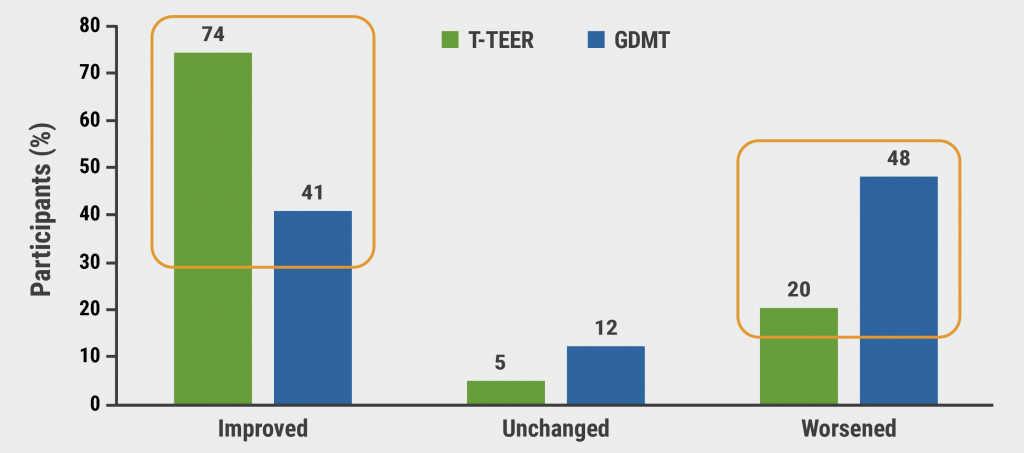https://doi.org/10.55788/288c2a8b
“Although we know that adherence to guidelines and patient education improve outcomes in patients with AF, we do not have solid evidence regarding the actual adherence to ESC Guidelines,” outlined Prof. Dipak Kotecha (University of Birmingham, UK) [1]. The STEEER-AF trial (NCT04396418), conducted by the ESC, assessed guideline adherence and tested an educational intervention to improve guideline adherence.
The investigators measured the adherence to class I and class III recommendations for stroke prevention and rhythm control among 1,732 patients with AF from France, Germany, Italy, Poland, Spain, and the UK. Additionally, 70 treatment centres were randomised 1:1 to an intervention group or a usual-care group. In the intervention group, the responsible healthcare professionals followed an online educational programme on improving patient adherence in the AF population.
Baseline adherence to all relevant class I and III ESC guideline recommendations were low for stroke prevention (61.0%) and abysmal for rhythm control (21.0%). On the bright side, the intervention was associated with a 51% increase in adherence to rhythm control guideline recommendations (21.4% to 33.9%), significantly outperforming the control arm (20.5% to 22.9%; adjusted risk ratio 1.51; 95% CI 1.04–2.18; P=0.03). For stroke prevention, the corresponding results in the intervention arm were 63.4% at baseline to 67.5% at follow-up; in the usual-care arm, the adherence rate went from 58.6% to 60.9% (adjusted risk ratio 1.10; 95% CI 0.97–1.24; P=0.13).
“The outcomes of this trial should be an eye-opener for the community,” argued Prof. Kotecha. “We have all these excellent trials with novel options to improve the outcomes for our patients. However, it is now demonstrated that the implementation is lacking. Without adherence, patients do not achieve their optimal outcomes,” emphasised Prof. Kotecha.
- Kotecha D, et al. STEEER-AF: Stroke prevention and rhythm control therapy: evaluation of an educational programme of the ESC in a cluster-randomised trial in patients with atrial fibrillation. HOTLINE 6, ESC Congress 2024, 30 Aug–02 Sept, London, UK.
Copyright ©2024 Medicom Medical Publishers
Posted on
Previous Article
« SCOFF: To fast or not to fast, that’s the question Next Article
RESHAPE-HF2: Not a “tie-breaker” for TEER in heart failure »
« SCOFF: To fast or not to fast, that’s the question Next Article
RESHAPE-HF2: Not a “tie-breaker” for TEER in heart failure »
Table of Contents: ESC 2024
Featured articles
Meet the Expert: Dr Abdullahi Mohamed on Iron Deficiency in Patients with HF
2024 ESC Guidelines in a Nutshell
Guidelines for the management of elevated blood pressure and hypertension
Guidelines for the management of chronic coronary syndromes
Guidelines for the management of atrial fibrillation
Guidelines for the management of peripheral artery and aortic diseases
Crossing Borders in Arrhythmia
EPIC-CAD: What is the best antithrombotic approach in high-risk AF plus stable CAD?
OCEANIC-AF: Asundexian inferior to apixaban for ischaemic stroke prevention in AF
MIRACLE-AF: Elegant solution to improve AF care in rural China
SUPPRESS-AF: What is the value of adding LVA ablation to PVI in AF?
Clever Ideas for Coronary Artery Disease
ABYSS: Can beta-blocker safely be interrupted post-MI?
SWEDEGRAFT: Can a no-touch vein harvesting technique improve outcomes in CABG?
Bioadaptor meets expectations in reducing target lesion failures in coronary artery disease
REC-CAGEFREE I: Can we avoid permanent stenting with drug-coated balloons?
OCCUPI: OCT-guided PCI improves outcomes in complex CAD
Highway to Hypertension Control
Low-dose 3-drug pill GMRx2 shows promise in lowering BP
Is administering BP medication in the evening better than in the morning?
VERONICA: Improving BP control in Africa with a simple strategy
High-end Trials in Heart Failure
FINEARTS-HF: Finerenone improves outcomes in heart failure with preserved ejection fraction
MRAs show varied efficacy in heart failure across ejection fractions
MATTERHORN: Transcatheter repair matches surgery for HF with secondary mitral regurgitation
RESHAPE-HF2: Not a “tie-breaker” for TEER in heart failure
Practical Gains in Screening and Diagnostics
STEEER-AF: Shockingly low adherence to ESC atrial fibrillation guidelines
SCOFF: To fast or not to fast, that’s the question
WESTCOR-POC: Point-of-care hs-troponin testing increases emergency department efficiency
PROTEUS: Can AI improve decision-making around stress echocardiography?
RAPIDxAI: Can AI-augmented chest pain assessment improve cardiovascular outcomes?
Miscellaneous Achievements in Cardiology
HELIOS-B: Vutrisiran candidate for SoC in ATTR cardiomyopathy
Does RAS inhibitor discontinuation affect outcomes after non-cardiac surgery?
Novel approach to managing severe tricuspid regurgitation proves its value
NOTION-3: TAVI plus PCI improves outcomes in CAD plus severe aortic stenosis
RHEIA: TAVI outperformed surgery in women with aortic stenosis
Related Articles

November 7, 2024
HELIOS-B: Vutrisiran candidate for SoC in ATTR cardiomyopathy
© 2024 Medicom Medical Publishers. All rights reserved. Terms and Conditions | Privacy Policy
HEAD OFFICE
Laarderhoogtweg 25
1101 EB Amsterdam
The Netherlands
T: +31 85 4012 560
E: publishers@medicom-publishers.com

